Commercial Law 1 - Negligence: Case Study Analysis and Discussion
VerifiedAdded on 2020/05/16
|6
|1375
|99
Case Study
AI Summary
This case study examines a commercial law dispute centered on negligence, involving a customer, Tamara, who slipped on ice cream in a supermarket (Aldi) and sustained injuries. The core legal issue revolves around whether the supermarket breached its duty of care. The analysis delves into the principles of negligence, including the requirements established in Donoghue v Stevenson, and the concept of proximate cause. The case explores the supermarket's responsibility for maintaining a safe environment for customers, the foreseeability of harm, and the application of legal precedents. The student argues that the supermarket failed to uphold its duty of care, leading to Tamara's injuries, and therefore, the supermarket is liable for negligence. The conclusion reinforces the supermarket's liability, emphasizing the importance of duty of care in commercial settings and referencing relevant case laws.
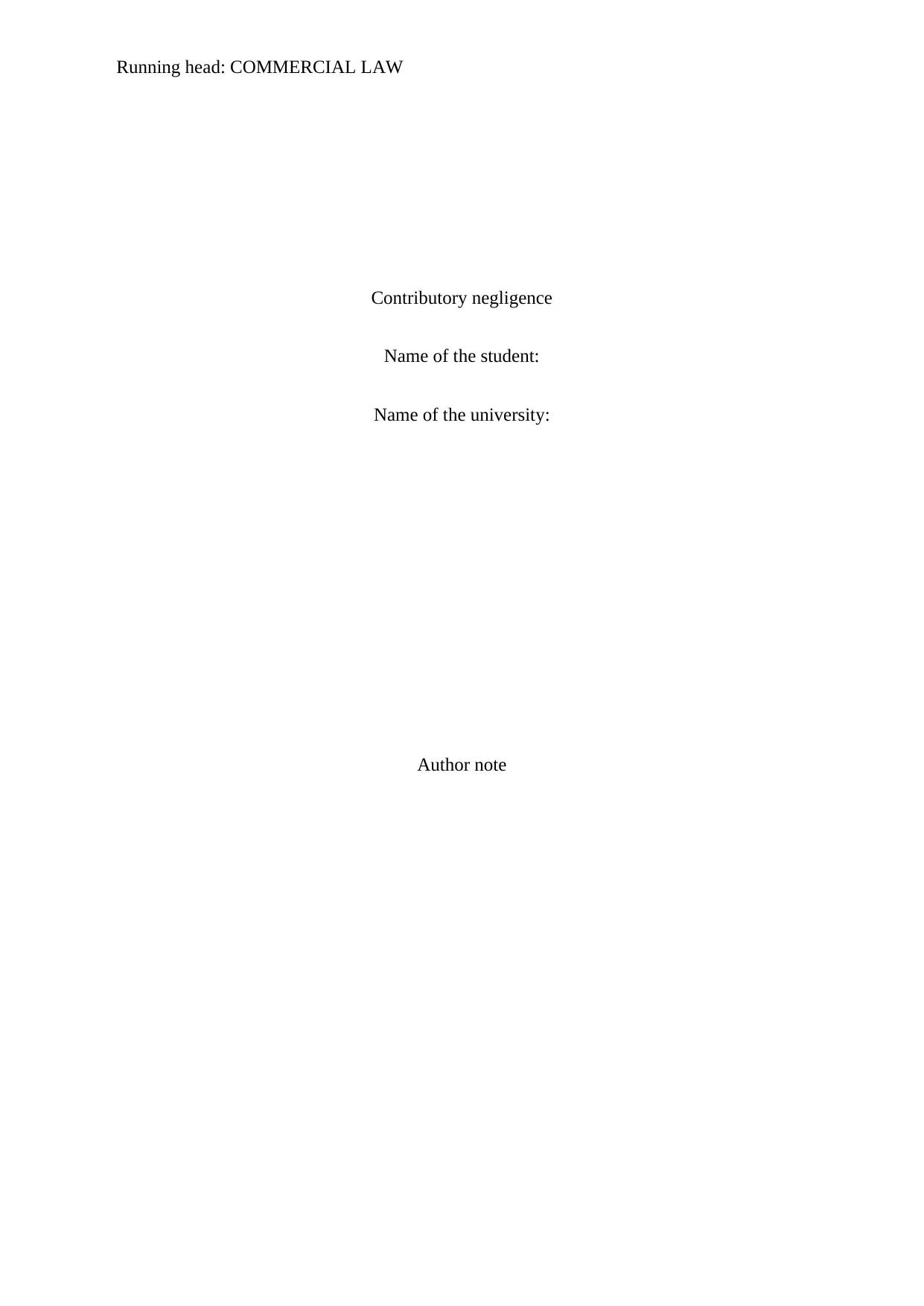
Running head: COMMERCIAL LAW
Contributory negligence
Name of the student:
Name of the university:
Author note
Contributory negligence
Name of the student:
Name of the university:
Author note
Paraphrase This Document
Need a fresh take? Get an instant paraphrase of this document with our AI Paraphraser
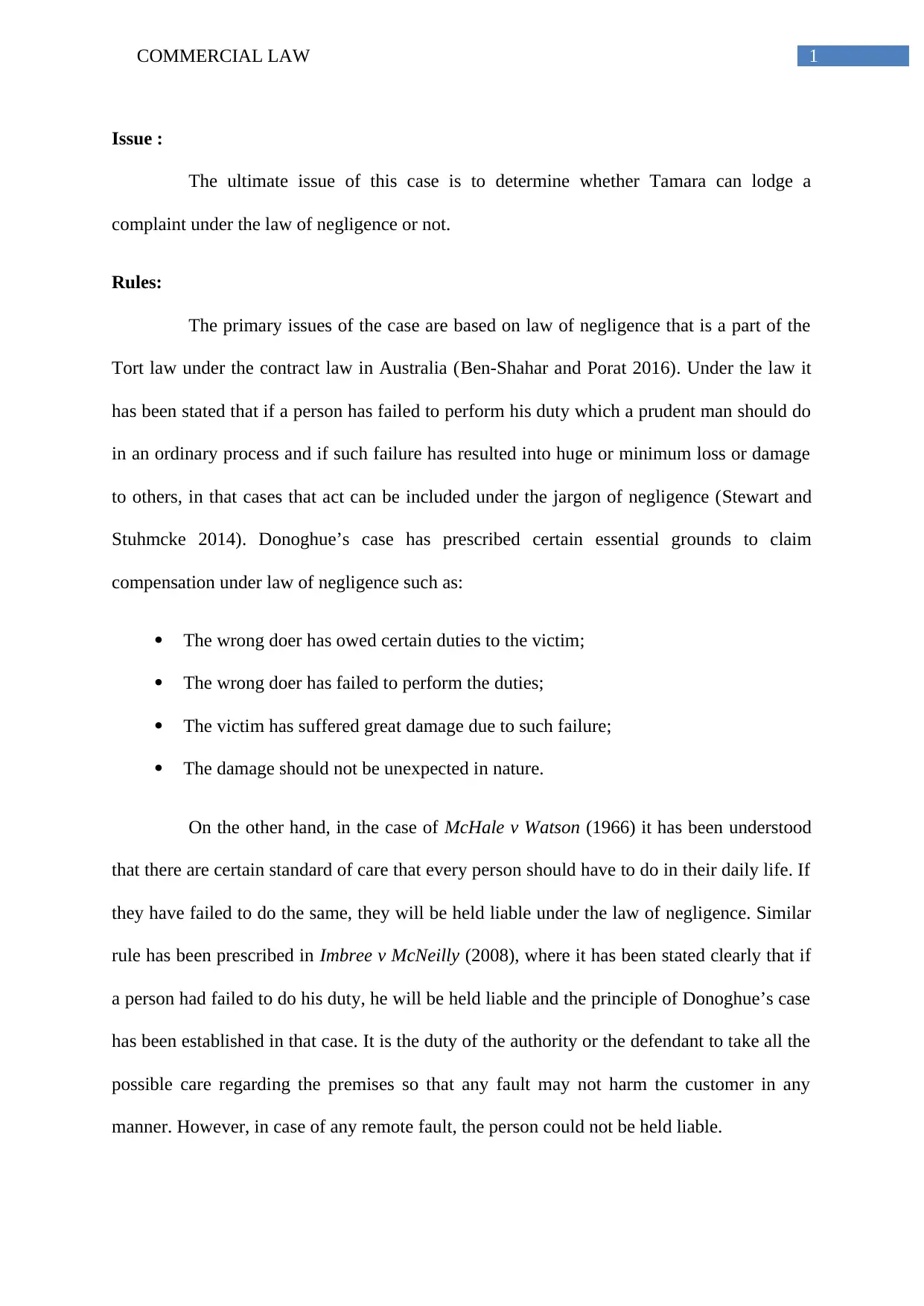
1COMMERCIAL LAW
Issue :
The ultimate issue of this case is to determine whether Tamara can lodge a
complaint under the law of negligence or not.
Rules:
The primary issues of the case are based on law of negligence that is a part of the
Tort law under the contract law in Australia (Ben-Shahar and Porat 2016). Under the law it
has been stated that if a person has failed to perform his duty which a prudent man should do
in an ordinary process and if such failure has resulted into huge or minimum loss or damage
to others, in that cases that act can be included under the jargon of negligence (Stewart and
Stuhmcke 2014). Donoghue’s case has prescribed certain essential grounds to claim
compensation under law of negligence such as:
The wrong doer has owed certain duties to the victim;
The wrong doer has failed to perform the duties;
The victim has suffered great damage due to such failure;
The damage should not be unexpected in nature.
On the other hand, in the case of McHale v Watson (1966) it has been understood
that there are certain standard of care that every person should have to do in their daily life. If
they have failed to do the same, they will be held liable under the law of negligence. Similar
rule has been prescribed in Imbree v McNeilly (2008), where it has been stated clearly that if
a person had failed to do his duty, he will be held liable and the principle of Donoghue’s case
has been established in that case. It is the duty of the authority or the defendant to take all the
possible care regarding the premises so that any fault may not harm the customer in any
manner. However, in case of any remote fault, the person could not be held liable.
Issue :
The ultimate issue of this case is to determine whether Tamara can lodge a
complaint under the law of negligence or not.
Rules:
The primary issues of the case are based on law of negligence that is a part of the
Tort law under the contract law in Australia (Ben-Shahar and Porat 2016). Under the law it
has been stated that if a person has failed to perform his duty which a prudent man should do
in an ordinary process and if such failure has resulted into huge or minimum loss or damage
to others, in that cases that act can be included under the jargon of negligence (Stewart and
Stuhmcke 2014). Donoghue’s case has prescribed certain essential grounds to claim
compensation under law of negligence such as:
The wrong doer has owed certain duties to the victim;
The wrong doer has failed to perform the duties;
The victim has suffered great damage due to such failure;
The damage should not be unexpected in nature.
On the other hand, in the case of McHale v Watson (1966) it has been understood
that there are certain standard of care that every person should have to do in their daily life. If
they have failed to do the same, they will be held liable under the law of negligence. Similar
rule has been prescribed in Imbree v McNeilly (2008), where it has been stated clearly that if
a person had failed to do his duty, he will be held liable and the principle of Donoghue’s case
has been established in that case. It is the duty of the authority or the defendant to take all the
possible care regarding the premises so that any fault may not harm the customer in any
manner. However, in case of any remote fault, the person could not be held liable.
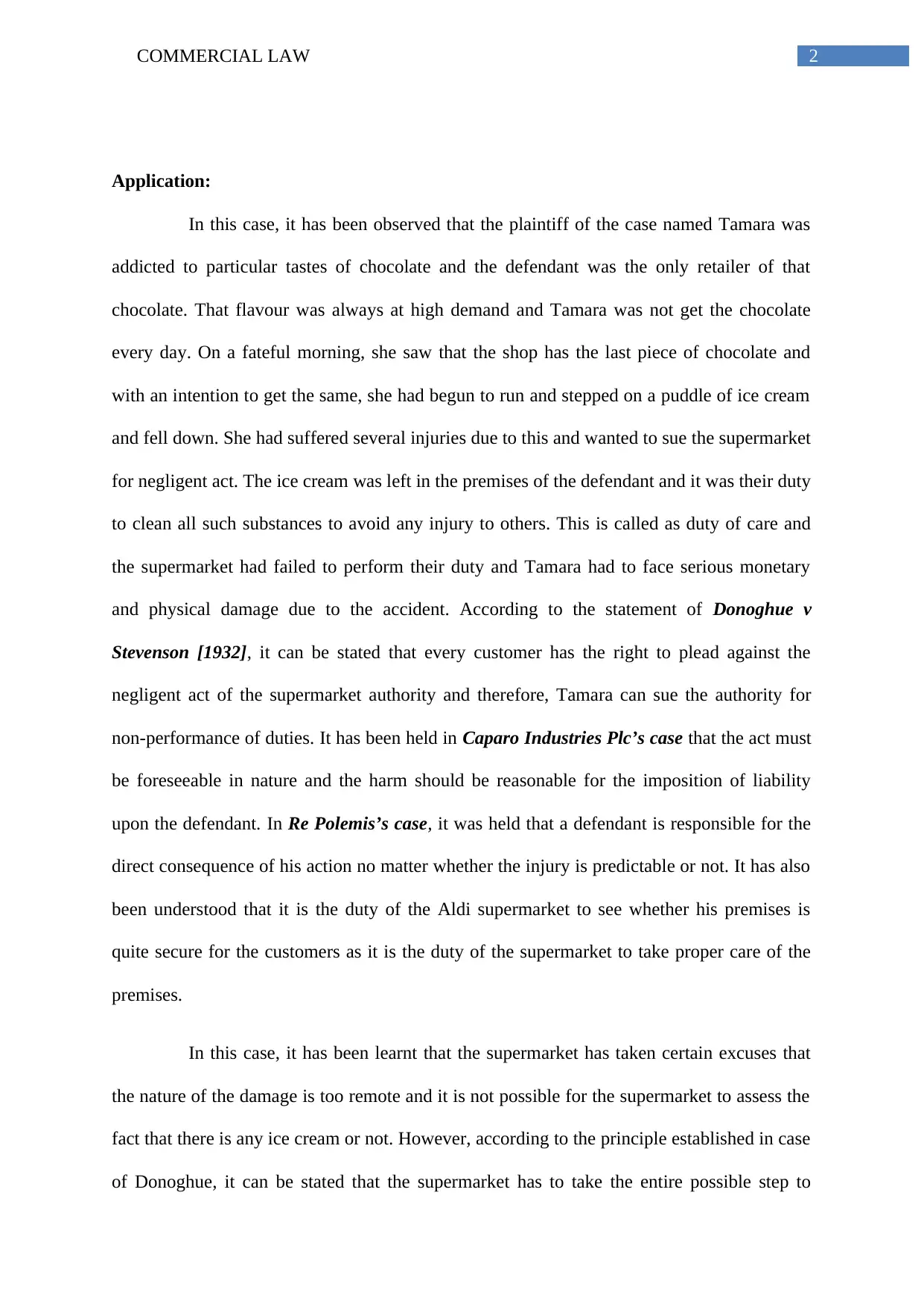
2COMMERCIAL LAW
Application:
In this case, it has been observed that the plaintiff of the case named Tamara was
addicted to particular tastes of chocolate and the defendant was the only retailer of that
chocolate. That flavour was always at high demand and Tamara was not get the chocolate
every day. On a fateful morning, she saw that the shop has the last piece of chocolate and
with an intention to get the same, she had begun to run and stepped on a puddle of ice cream
and fell down. She had suffered several injuries due to this and wanted to sue the supermarket
for negligent act. The ice cream was left in the premises of the defendant and it was their duty
to clean all such substances to avoid any injury to others. This is called as duty of care and
the supermarket had failed to perform their duty and Tamara had to face serious monetary
and physical damage due to the accident. According to the statement of Donoghue v
Stevenson [1932], it can be stated that every customer has the right to plead against the
negligent act of the supermarket authority and therefore, Tamara can sue the authority for
non-performance of duties. It has been held in Caparo Industries Plc’s case that the act must
be foreseeable in nature and the harm should be reasonable for the imposition of liability
upon the defendant. In Re Polemis’s case, it was held that a defendant is responsible for the
direct consequence of his action no matter whether the injury is predictable or not. It has also
been understood that it is the duty of the Aldi supermarket to see whether his premises is
quite secure for the customers as it is the duty of the supermarket to take proper care of the
premises.
In this case, it has been learnt that the supermarket has taken certain excuses that
the nature of the damage is too remote and it is not possible for the supermarket to assess the
fact that there is any ice cream or not. However, according to the principle established in case
of Donoghue, it can be stated that the supermarket has to take the entire possible step to
Application:
In this case, it has been observed that the plaintiff of the case named Tamara was
addicted to particular tastes of chocolate and the defendant was the only retailer of that
chocolate. That flavour was always at high demand and Tamara was not get the chocolate
every day. On a fateful morning, she saw that the shop has the last piece of chocolate and
with an intention to get the same, she had begun to run and stepped on a puddle of ice cream
and fell down. She had suffered several injuries due to this and wanted to sue the supermarket
for negligent act. The ice cream was left in the premises of the defendant and it was their duty
to clean all such substances to avoid any injury to others. This is called as duty of care and
the supermarket had failed to perform their duty and Tamara had to face serious monetary
and physical damage due to the accident. According to the statement of Donoghue v
Stevenson [1932], it can be stated that every customer has the right to plead against the
negligent act of the supermarket authority and therefore, Tamara can sue the authority for
non-performance of duties. It has been held in Caparo Industries Plc’s case that the act must
be foreseeable in nature and the harm should be reasonable for the imposition of liability
upon the defendant. In Re Polemis’s case, it was held that a defendant is responsible for the
direct consequence of his action no matter whether the injury is predictable or not. It has also
been understood that it is the duty of the Aldi supermarket to see whether his premises is
quite secure for the customers as it is the duty of the supermarket to take proper care of the
premises.
In this case, it has been learnt that the supermarket has taken certain excuses that
the nature of the damage is too remote and it is not possible for the supermarket to assess the
fact that there is any ice cream or not. However, according to the principle established in case
of Donoghue, it can be stated that the supermarket has to take the entire possible step to
⊘ This is a preview!⊘
Do you want full access?
Subscribe today to unlock all pages.

Trusted by 1+ million students worldwide
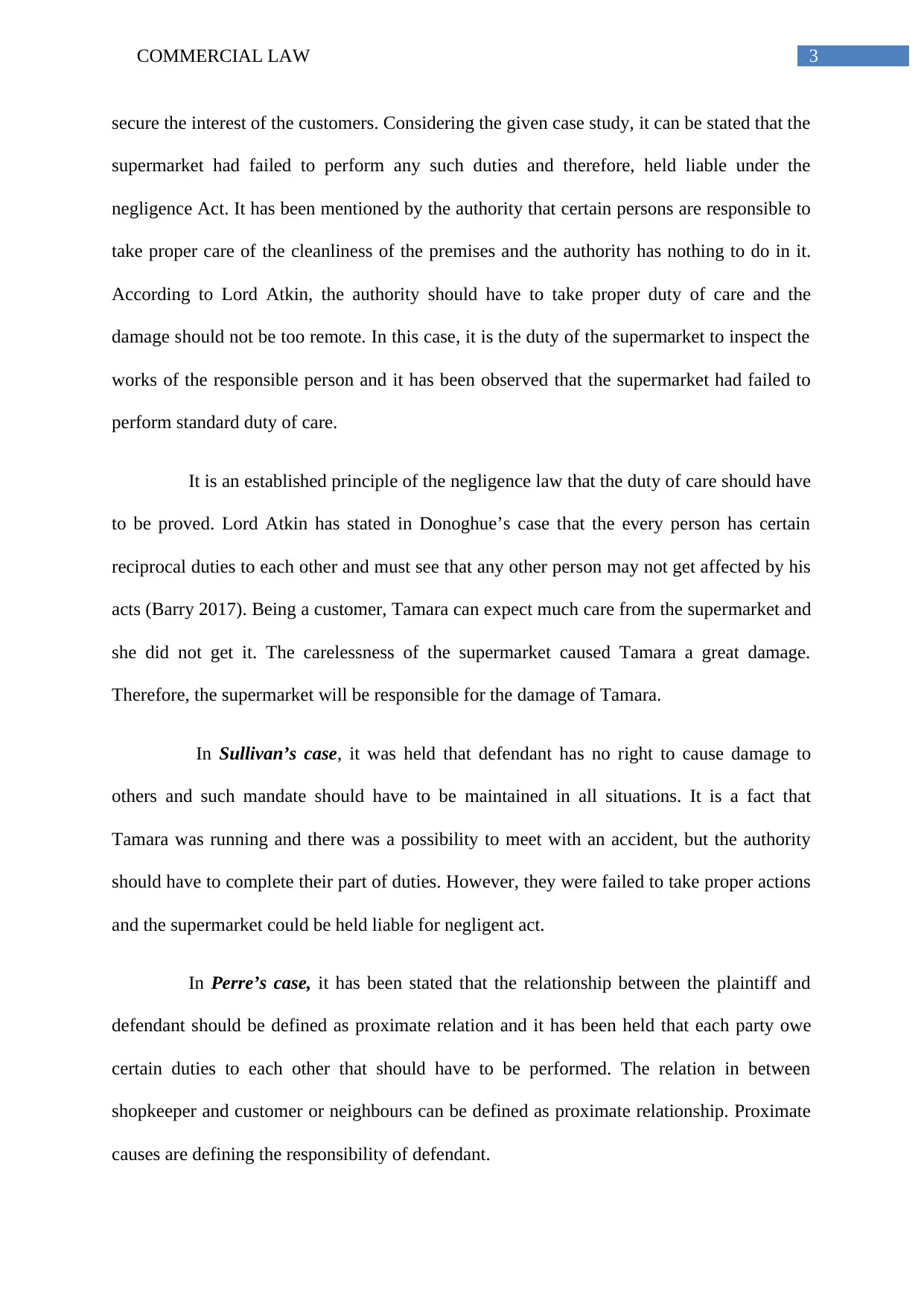
3COMMERCIAL LAW
secure the interest of the customers. Considering the given case study, it can be stated that the
supermarket had failed to perform any such duties and therefore, held liable under the
negligence Act. It has been mentioned by the authority that certain persons are responsible to
take proper care of the cleanliness of the premises and the authority has nothing to do in it.
According to Lord Atkin, the authority should have to take proper duty of care and the
damage should not be too remote. In this case, it is the duty of the supermarket to inspect the
works of the responsible person and it has been observed that the supermarket had failed to
perform standard duty of care.
It is an established principle of the negligence law that the duty of care should have
to be proved. Lord Atkin has stated in Donoghue’s case that the every person has certain
reciprocal duties to each other and must see that any other person may not get affected by his
acts (Barry 2017). Being a customer, Tamara can expect much care from the supermarket and
she did not get it. The carelessness of the supermarket caused Tamara a great damage.
Therefore, the supermarket will be responsible for the damage of Tamara.
In Sullivan’s case, it was held that defendant has no right to cause damage to
others and such mandate should have to be maintained in all situations. It is a fact that
Tamara was running and there was a possibility to meet with an accident, but the authority
should have to complete their part of duties. However, they were failed to take proper actions
and the supermarket could be held liable for negligent act.
In Perre’s case, it has been stated that the relationship between the plaintiff and
defendant should be defined as proximate relation and it has been held that each party owe
certain duties to each other that should have to be performed. The relation in between
shopkeeper and customer or neighbours can be defined as proximate relationship. Proximate
causes are defining the responsibility of defendant.
secure the interest of the customers. Considering the given case study, it can be stated that the
supermarket had failed to perform any such duties and therefore, held liable under the
negligence Act. It has been mentioned by the authority that certain persons are responsible to
take proper care of the cleanliness of the premises and the authority has nothing to do in it.
According to Lord Atkin, the authority should have to take proper duty of care and the
damage should not be too remote. In this case, it is the duty of the supermarket to inspect the
works of the responsible person and it has been observed that the supermarket had failed to
perform standard duty of care.
It is an established principle of the negligence law that the duty of care should have
to be proved. Lord Atkin has stated in Donoghue’s case that the every person has certain
reciprocal duties to each other and must see that any other person may not get affected by his
acts (Barry 2017). Being a customer, Tamara can expect much care from the supermarket and
she did not get it. The carelessness of the supermarket caused Tamara a great damage.
Therefore, the supermarket will be responsible for the damage of Tamara.
In Sullivan’s case, it was held that defendant has no right to cause damage to
others and such mandate should have to be maintained in all situations. It is a fact that
Tamara was running and there was a possibility to meet with an accident, but the authority
should have to complete their part of duties. However, they were failed to take proper actions
and the supermarket could be held liable for negligent act.
In Perre’s case, it has been stated that the relationship between the plaintiff and
defendant should be defined as proximate relation and it has been held that each party owe
certain duties to each other that should have to be performed. The relation in between
shopkeeper and customer or neighbours can be defined as proximate relationship. Proximate
causes are defining the responsibility of defendant.
Paraphrase This Document
Need a fresh take? Get an instant paraphrase of this document with our AI Paraphraser
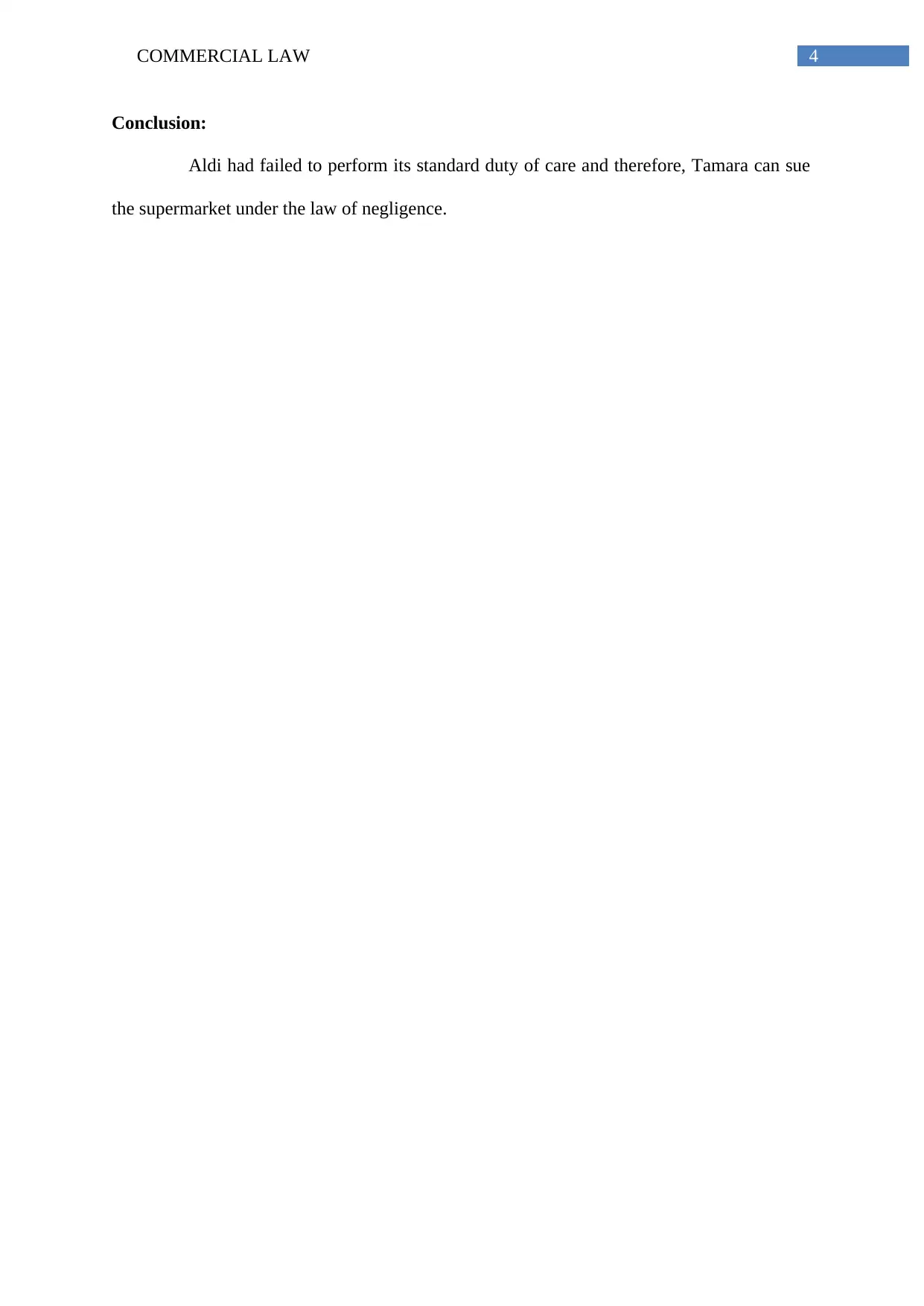
4COMMERCIAL LAW
Conclusion:
Aldi had failed to perform its standard duty of care and therefore, Tamara can sue
the supermarket under the law of negligence.
Conclusion:
Aldi had failed to perform its standard duty of care and therefore, Tamara can sue
the supermarket under the law of negligence.
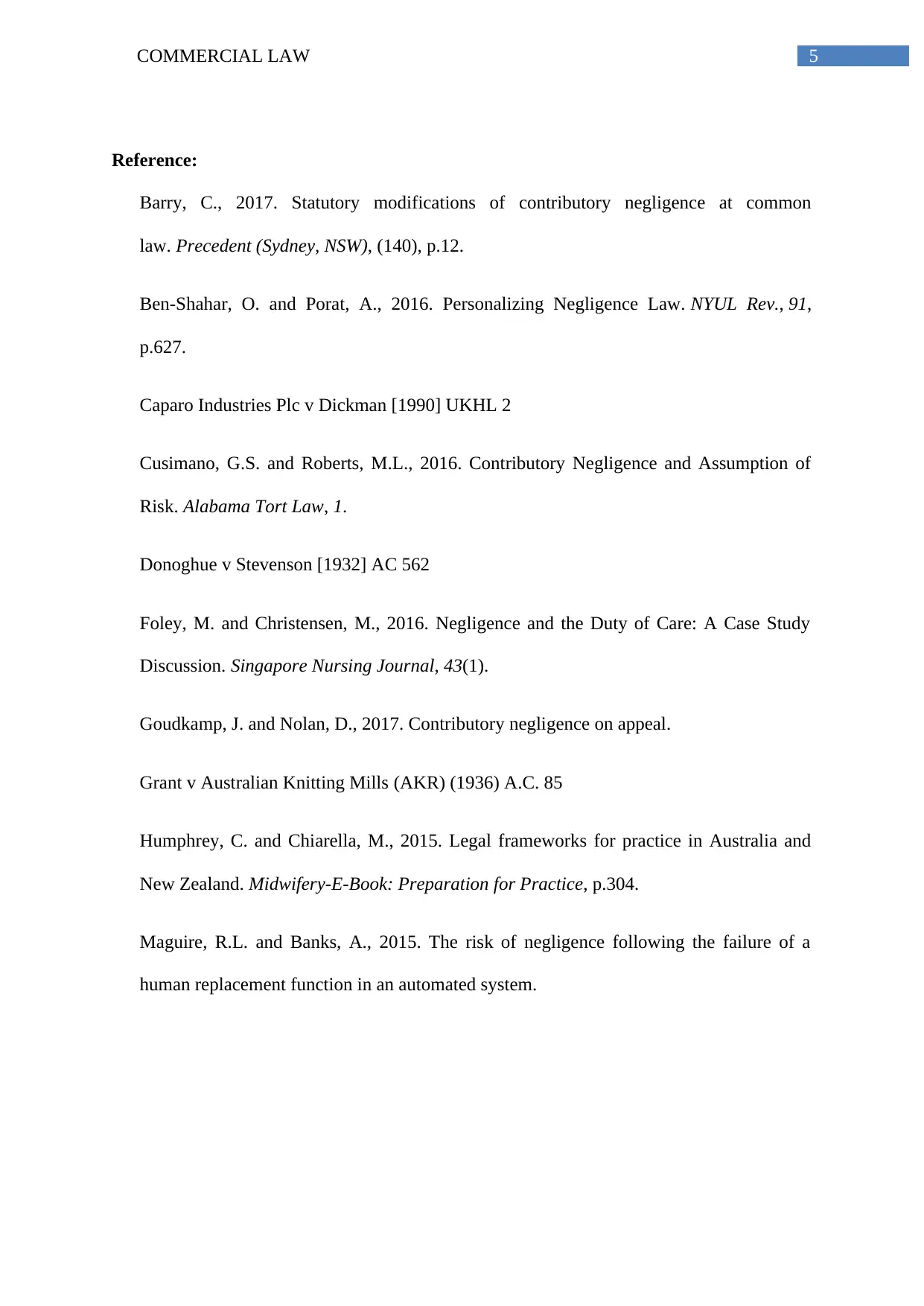
5COMMERCIAL LAW
Reference:
Barry, C., 2017. Statutory modifications of contributory negligence at common
law. Precedent (Sydney, NSW), (140), p.12.
Ben-Shahar, O. and Porat, A., 2016. Personalizing Negligence Law. NYUL Rev., 91,
p.627.
Caparo Industries Plc v Dickman [1990] UKHL 2
Cusimano, G.S. and Roberts, M.L., 2016. Contributory Negligence and Assumption of
Risk. Alabama Tort Law, 1.
Donoghue v Stevenson [1932] AC 562
Foley, M. and Christensen, M., 2016. Negligence and the Duty of Care: A Case Study
Discussion. Singapore Nursing Journal, 43(1).
Goudkamp, J. and Nolan, D., 2017. Contributory negligence on appeal.
Grant v Australian Knitting Mills (AKR) (1936) A.C. 85
Humphrey, C. and Chiarella, M., 2015. Legal frameworks for practice in Australia and
New Zealand. Midwifery-E-Book: Preparation for Practice, p.304.
Maguire, R.L. and Banks, A., 2015. The risk of negligence following the failure of a
human replacement function in an automated system.
Reference:
Barry, C., 2017. Statutory modifications of contributory negligence at common
law. Precedent (Sydney, NSW), (140), p.12.
Ben-Shahar, O. and Porat, A., 2016. Personalizing Negligence Law. NYUL Rev., 91,
p.627.
Caparo Industries Plc v Dickman [1990] UKHL 2
Cusimano, G.S. and Roberts, M.L., 2016. Contributory Negligence and Assumption of
Risk. Alabama Tort Law, 1.
Donoghue v Stevenson [1932] AC 562
Foley, M. and Christensen, M., 2016. Negligence and the Duty of Care: A Case Study
Discussion. Singapore Nursing Journal, 43(1).
Goudkamp, J. and Nolan, D., 2017. Contributory negligence on appeal.
Grant v Australian Knitting Mills (AKR) (1936) A.C. 85
Humphrey, C. and Chiarella, M., 2015. Legal frameworks for practice in Australia and
New Zealand. Midwifery-E-Book: Preparation for Practice, p.304.
Maguire, R.L. and Banks, A., 2015. The risk of negligence following the failure of a
human replacement function in an automated system.
⊘ This is a preview!⊘
Do you want full access?
Subscribe today to unlock all pages.

Trusted by 1+ million students worldwide
1 out of 6
Related Documents
Your All-in-One AI-Powered Toolkit for Academic Success.
+13062052269
info@desklib.com
Available 24*7 on WhatsApp / Email
![[object Object]](/_next/static/media/star-bottom.7253800d.svg)
Unlock your academic potential
Copyright © 2020–2026 A2Z Services. All Rights Reserved. Developed and managed by ZUCOL.





